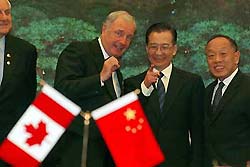China, Canada sign energy agreements
|
BEIJING, Jan. 21-- China and Canada agreed yesterday to take on the energy sector -- oil and gas, nuclear energy, energy efficiency and cleaner energy -- as "priority areas" of long-term mutual co-operation.
The two nations will encourage respective enterprises to expand commercial partnerships, the Statement on Energy Co-operation in the 21st Century indicated. The National Development and Reform Commission and Natural Resources Canada will maintain regular dialogue and exchanges of views. Contacts will be conducted through the Canada-China Joint Working Group on Energy Co-operation, under a 2001 memorandum of understanding (MOU) concerning co-operation in energy, the statement said. The nations are promising to uplift their relationship to a new level by "focusing their efforts strategically in areas of greatest mutual advantage," a joint statement issued after a meeting between Premier Wen Jiabao and his Canadian counterpart Paul Martin said. The sides have agreed upon a outline for the activities of a strategic working group that will try to identify and develop paths for broadening ties. "The work of the group will initially focus on enhancing our partnership in the fields of multilateral co-operation, natural resources and energy, and trade and investment," the document said. It will also tackle global security and multilateral co-operation, prosperity and sustainable growth, as well as promote people-to-people ties. "Significant development has been seen in our relationship in a wide-range of areas during the past few years," said Wen, when speaking to an a trade delegation of more than 300 entrepreneurs. "There is a need for the two countries to deepen understanding between each other," said Wen, adding that Canada has great advantages in energy and minerals, while China has advantages in the production of electrical appliances, daily necessities and electrical and mechanical products. The Canadian Prime Minister said Canada wishes to strengthen co-operation in natural resources, investment and other fields. "The Canadian business committee are here not for short-term prospects... but for a long-term co-operation," said Martin. A total of 13 statements, agreements and MOUs were signed between China and Canada, on co-operation in energy and minerals, culture, telecommunications and other sectors. For example, China's Putian Corporation and Canada's Nortel signed a pact to set up a joint venture for research and development, manufacture and sale of 3G mobile telecommunications equipment and products in China. "It signals a new level of co-operation between Putian and Canada's Nortel," said Xing Wei, president of Putian. "It will position us to capitalize on the tremendous opportunities presented by China's rapidly growing wireless industry and significantly accelerate the internationalization of our 3G (third generation mobiles) offerings," Xing said. |
